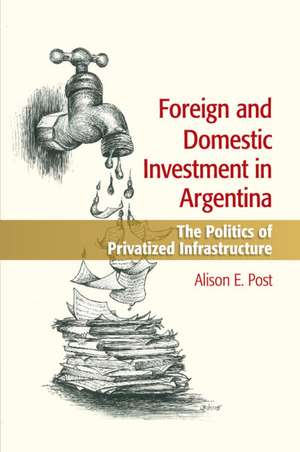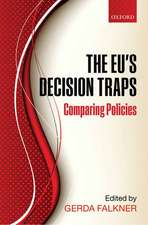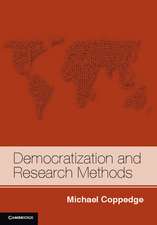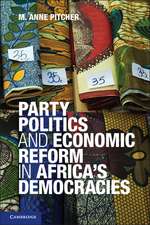Foreign and Domestic Investment in Argentina: The Politics of Privatized Infrastructure
Autor Alison E. Posten Limba Engleză Paperback – 26 sep 2018
| Toate formatele și edițiile | Preț | Express |
|---|---|---|
| Paperback (1) | 285.37 lei 6-8 săpt. | |
| Cambridge University Press – 26 sep 2018 | 285.37 lei 6-8 săpt. | |
| Hardback (1) | 695.74 lei 6-8 săpt. | |
| Cambridge University Press – 16 apr 2014 | 695.74 lei 6-8 săpt. |
Preț: 285.37 lei
Nou
Puncte Express: 428
Preț estimativ în valută:
54.61€ • 57.13$ • 45.36£
54.61€ • 57.13$ • 45.36£
Carte tipărită la comandă
Livrare economică 03-17 aprilie
Preluare comenzi: 021 569.72.76
Specificații
ISBN-13: 9781107637962
ISBN-10: 1107637961
Pagini: 264
Ilustrații: 4 b/w illus. 1 map 30 tables
Dimensiuni: 153 x 230 x 15 mm
Greutate: 0.4 kg
Editura: Cambridge University Press
Colecția Cambridge University Press
Locul publicării:New York, United States
ISBN-10: 1107637961
Pagini: 264
Ilustrații: 4 b/w illus. 1 map 30 tables
Dimensiuni: 153 x 230 x 15 mm
Greutate: 0.4 kg
Editura: Cambridge University Press
Colecția Cambridge University Press
Locul publicării:New York, United States
Cuprins
Introduction; 1. Informal contractual supports in weak institutional environments; 2. An overview of the Argentine privatizations; 3. The fragility of nonlocal contracts prior to the crisis; 4. Smoother sailing for all investors in less competitive provinces; 5. Home court advantages magnify after the crisis; 6. Diverse local holdings also prevail in calm political contexts; 7. Explaining contractual resilience in low- and middle-income countries; 8. Conclusion.
Recenzii
'Post's book is must-reading for anyone interested in the private provision of infrastructure services, and particularly the epidemic of cancelled concession contracts. The existing literature emphasizes the role of institutional features - such as international legal guarantees, independent regulators, and other formal property rights protections - in discouraging cancellation. But Post's in-depth study of 14 water concessions in Argentina suggests that informal property rights protections are more important. In particular, concessions led by domestic firms with diversified local holdings are much more resilient than those led by multi-national companies specializing in infrastructure because the domestic companies are more socially and politically embedded and have a wider variety of negotiating options.' José A. Gómez-Ibáñez, Derek C. Bok Professor of Urban Planning and Public Policy, Harvard University, Massachusetts
'Development studies has recently turned its attention to the legal environment facing business. Does greater accountability of government improve the rule of law and thus spur economic activity? Alison E. Post reminds us that firms play an important role in this process: that domestic firms with diverse local connections will have greater influence over regulation than foreign investors. It's refreshing to see such a sharp-eyed study that takes us back to the basics of political economy and has wide implications for the study of both privatization and foreign investment.' Stephan M. Haggard, University of California, San Diego
'What explains variation in the sustainability of private investments in politically volatile environments? This groundbreaking book addresses the question by illuminating the informal mechanisms that protect investors in the absence of formal legal safeguards in developing countries. Building on Vernon's analysis of the 'obsolescing bargaining' and Williamson's notion of 'relational contracting,' Alison E. Post not only documents but explains the conditions that make private investment more (or at times less) resilient to regulatory capture in the water and sanitation sectors. Her insightful contributions improve our understanding of the political conditions that shape the definition of property rights, while pointing to the vulnerability of institutions and treaties that require third-party enforcement. This book is a must-read for any scholar of economic development and comparative political economy more generally.' M. Victoria Murillo, Columbia University, New York
'Alison E. Post's insightful new book will shake up much received wisdom on the political economy of regulation and on property rights and firm strategies more generally. Strict property rights, backed up by powerful courts, are not the godsend they are presumed to be; they turn out, Post shows, to be brittle and ineffective. Moreover, diversified business groups, long thought to be waning vestiges of traditional capitalism, are in fact more flexible and committed partners in ongoing negotiations over inevitably evolving regulation. The exacting empirical research unveils the full complexities of Argentine politics but at the same time has broad implications for theorizing on firms, property rights, and regulation.' Ben Ross Schneider, Massachusetts Institute of Technology
'Development studies has recently turned its attention to the legal environment facing business. Does greater accountability of government improve the rule of law and thus spur economic activity? Alison E. Post reminds us that firms play an important role in this process: that domestic firms with diverse local connections will have greater influence over regulation than foreign investors. It's refreshing to see such a sharp-eyed study that takes us back to the basics of political economy and has wide implications for the study of both privatization and foreign investment.' Stephan M. Haggard, University of California, San Diego
'What explains variation in the sustainability of private investments in politically volatile environments? This groundbreaking book addresses the question by illuminating the informal mechanisms that protect investors in the absence of formal legal safeguards in developing countries. Building on Vernon's analysis of the 'obsolescing bargaining' and Williamson's notion of 'relational contracting,' Alison E. Post not only documents but explains the conditions that make private investment more (or at times less) resilient to regulatory capture in the water and sanitation sectors. Her insightful contributions improve our understanding of the political conditions that shape the definition of property rights, while pointing to the vulnerability of institutions and treaties that require third-party enforcement. This book is a must-read for any scholar of economic development and comparative political economy more generally.' M. Victoria Murillo, Columbia University, New York
'Alison E. Post's insightful new book will shake up much received wisdom on the political economy of regulation and on property rights and firm strategies more generally. Strict property rights, backed up by powerful courts, are not the godsend they are presumed to be; they turn out, Post shows, to be brittle and ineffective. Moreover, diversified business groups, long thought to be waning vestiges of traditional capitalism, are in fact more flexible and committed partners in ongoing negotiations over inevitably evolving regulation. The exacting empirical research unveils the full complexities of Argentine politics but at the same time has broad implications for theorizing on firms, property rights, and regulation.' Ben Ross Schneider, Massachusetts Institute of Technology
Notă biografică
Descriere
This book argues that for infrastructure privatization programs, differences in firm organizational structure explain the viability of privatization contracts in weak institutional environments.
















